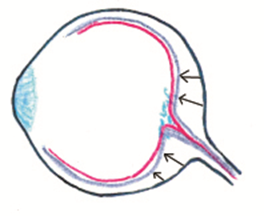What is Retinal Detachment?
Your eye is like a camera. The retina functions like the film inside a camera. It is light-sensitive tissue that lines the inside of the eye and captures pictures of the outside world.
In retinal detachment, the retina layer separates from the wall of the eyeball, which has the blood supply that feeds the retina. After the separation, the retina begins to starve and die off.
As this happens, you might see flashing lights, new floaters, or a dark curtain that comes across your vision. Retinal detachment is not painful.
It is very important that you see an eye doctor if you think you are having a retinal detachment. It needs to be repaired with surgery to prevent vision loss. Your vision after the surgery will depend on how much of the retina separated and how much time passed before it was repaired.
What Causes Retinal Detachment?
Many things can cause a retinal detachment. If the eyeball is a room, the retina is the wallpaper that covers the walls.
The most common type is caused by a small hole in the retina, caused by trauma, severe nearsightedness, or aging. Fluids inside the eye can go underneath the retina through the hole and cause it to peel away from the wall.
Retinal detachment can also happen if there is something pulling on the retina, like abnormal blood vessels from diabetic retinopathy or scar tissue from previous surgery or inflammation.
Who gets retinal detachments?
You are more likely to get retinal detachments if you have these risk factors:
- Older age
- Very nearsighted
- Trauma
- Other family members with retinal detachment
- Uncontrolled diabetes
- Previous eye surgery
- Chronic inflammation
What are the symptoms?
- Flashes of light, especially from the side of your vision
- Blurry vision
- New floaters in the eye
- A shade or shadow that comes over one eye
- Partial loss of vision in one eye
How do I know if I have retinal detachment?
You will likely have bright flashes of light in your peripheral vision. This is caused by the retina separating from the wall of the eyeball. You may also have floaters or blurry vision if there is bleeding. The amount of vision loss depends on which part of the retina becomes detached. If the macula, which is responsible for central fine vision becomes detached, you will have very poor vision.
When you go to the eye doctor, he can see your retina through an instrument called the indirect ophthalmoscope, or by looking through the microscope. If you have a retinal detachment, he will see the area of detachment in the back of your eye. If the view is blocked by blood or scar tissue, the eye doctor may use an ultrasound to see if your retina has separated fro the back wall.
What should I do if I may be having a retinal detachment?
A retinal detachment is a medical emergency and you must be seen by an eye doctor within 24 hours of having symptoms.
Is there anything I can do to prevent retinal detachment?
- Protect your eyes from trauma by using protective eyewear
- Control your blood sugar if you have diabetes
- If you have any risk factors for retinal detachment, see your eye doctor regularly. Lasers can be used to seal off small holes in the retina before they become a problem and cause retinal detachment.
What are the treatment options?
Most people will need surgery to repair the retinal detachment. Depending on the type and location of your detachment, your doctor may do surgery right away or in the next few days.
The goal of the surgery is to reattach the retina to the wall of the eyeball.
For small tears, the surgery can usually be done in the office.
- Lasers and Cryotherapy can seal small holes and tack the retina back on the eye wall
- A small gas bubble may be injected in your eye to hold the retina against the wall while it heals
For larger detachments, you may have to go to the operating room.
- Scleral buckle is like putting a belt on the eyeball. It squeezes the walls in against the retina.
- Vitrectomy removes the inside contents of the eye. It may be used if there is a lot of bleeding or scarring inside your eye.
Will my vision return after I have surgery for retinal detachment?
Your recovery depends on a number of factors:
- Location and size of the retinal detachment
- If it involved the macula
- How soon it was repaired
Some patients regain their vision completely after surgery. Others may get back little or no vision. You have the best chance of recovery if you have early treatment and a small detachment that did not involve the macula.
Resources
Prepared in partnership with Lily Huang, MD, Class of 2013, Case Western Reserve University School of Medicine.
For more information:
Go to the Eye and Vision Care health topic.
